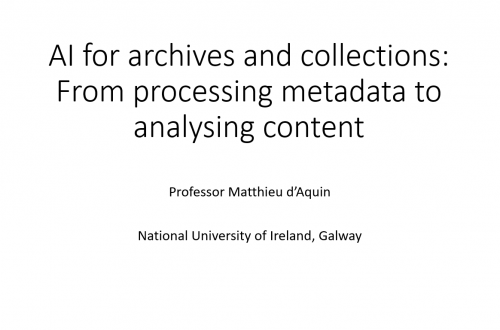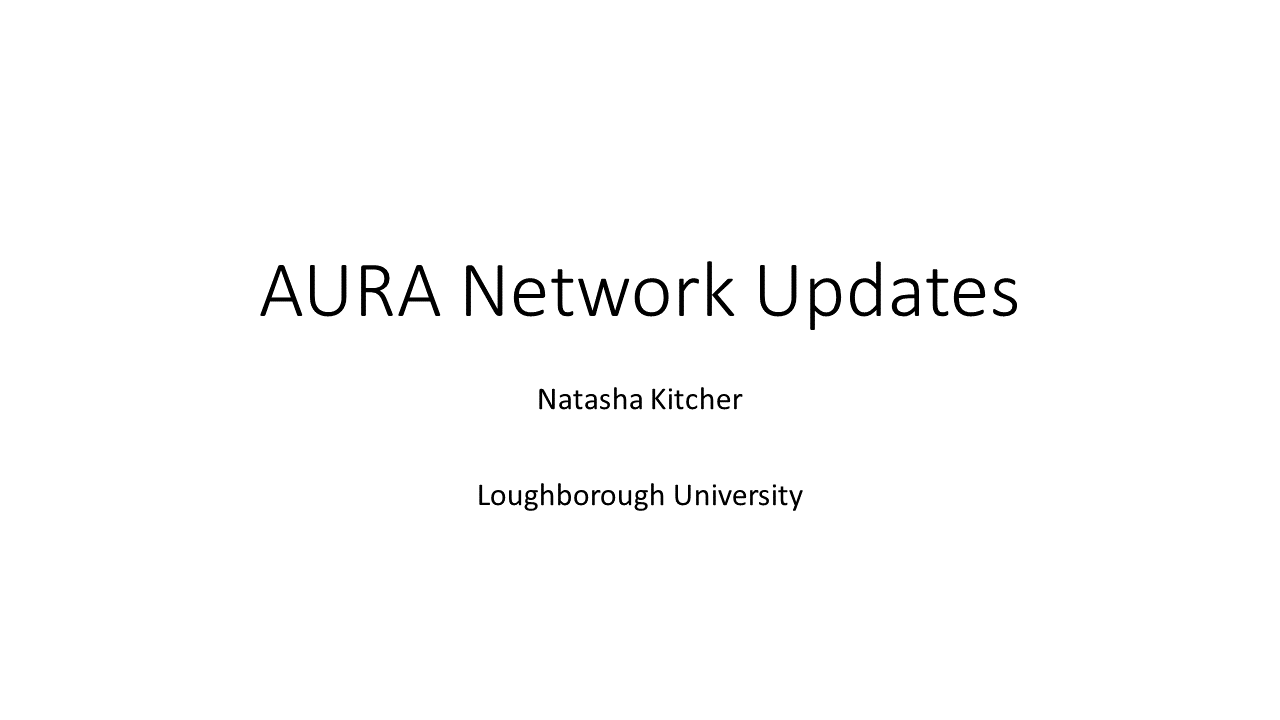
Workshop 3 – Mathieu d’Aquin – AI for archive and collections
Mathieu d’Aquin (Professor of Infomatics, National University of Ireland, Galway)…

In January 2021, I was lucky enough to join the AURA Network as Research Assistant. I was initially drawn to the project because of its focus on cultural heritage organisations and ‘unlocking’ cultural assets for the public. My Masters was in Public History, so I am interested in engaging wider audiences with the behind-the-scenes parts of history typically saved for the privileged few. Could Artificial Intelligence play a part in increasing the accessibility of history? I was not sure, but I was keen to learn more.
As someone who longed to study Engineering at University but was held back by a brain that would always rather read E. H. Carr than G. H. Hardy, I have frequently found myself reading into the history of technology and science. Because of this, I have often turned to scientists to help interpret the scientific history I write. It is rare, however, that I have had the chance to talk to scientists about solving specific problems in history. This is what AURA does.
As you probably know by now, AURA brings together archivists, Digital Humanists, Computer Scientists, and other key stake holders in the field to discuss ways to make archives more accessible. These questions of access have come about as we digitise more data, and as more data comes to the archive already in digital form. These digitised and digital files can be a challenge to release to the public, as they may contain sensitive information, or can be so large that they are nearly impossible to interpret and effectively use.
My first task when I started in January was not, thankfully, solving the issue of unlocking archives all by myself. Instead, I assisted with the organisation of AURA’s third workshop, Artificial Intelligence and Archives: What comes next? Here we brought our usual groups together to talk about the future of AI and Archives, and plan new projects in the field.
We invited a wide range of speakers to this event, including Professor Andrew Prescott who gave an excellent keynote addressing the ethical and historiographical challenge of using AI for historical work. If you have not already see his keynote, or met Our Friends Electric, I recommend you give it a watch on our blog (https://www.aura-network.net/2021/04/09/workshop-3-andrew-prescott-can-archives-make-ai-better/).
AURA was born-digital in the sense that all our workshops have been held online, which has enabled us to share most of the talks given since the beginning on our website (available here: https://www.aura-network.net/blog/). Our first workshop in November 2020 focused on Open Data versus Privacy and our second shared the same title as an upcoming special issue, AI and Archives: Current Challenges and Prospects of Digital and Born-digital Archives. Uploading some of these videos has given me the chance to see some of the great papers I missed out on before my tenure. These videos have been invaluable in promoting the work of the project and provide a useful frame of reference to explain some of the key challenges in AI today. The interdisciplinary nature of the AURA network has bred papers that are applicable to a variety of fields and demonstrate AIs potential, as well as its potential pitfalls, in ways that extend far beyond archives and cultural assets.
Now, with the workshops over, work has turned to the two special issues. Through my work as RA, I have assisted with the copyediting for our first special issue, which will be published in AI & Society later this year (with a few articles available open access). I think the great thing about AURA is that it concerns all of history, and any historical institution that will have it, meaning you can sink your teeth into a wide range of time periods and disciplines while thinking about what the future of AI and Machine Learning might look be when they are used for historical study. So, look out for the first special issue, ‘Born Digital – Shedding Light into the Darkness of Digital Culture,’ for a chance to immerse yourself in plenty of examples of AI being used for history.
The next special issue is still being written, with full articles being accepted for the Archival Science issue up until 30th June (more details here: https://www.aura-network.net/wp-content/uploads/2021/02/Special-Issue-1-UPDATE.pdf). An article I have been involved with is being written by Dr Jaillant at Loughborough University, to be submitted later on this year. For this piece, 21 interviews have been conducted with professionals in the GLAM sector to discuss challenges and prospects of digital and digitised collections. As a public historian, this was an enjoyable experience, and it was great to talk to so many knowledgeable professionals through the medium of Teams. I certainly have some new destinations on my post-covid research list, including the History of Parliament Trust and Transport for London Corporate Archives. Also look out for snippets from partners outside of the UK, including Europeana and Harvard University.
AURA does some great work, and it has been a joy to be a part of this interdisciplinary network over the last few months. I can’t wait to see what comes next, and as I’ve been shouting about recently (see my article in the Digital Preservation Coalition: https://www.dpconline.org/blog/aura-nkitcher-may21) the work is far from over. Our first three workshops were really the start of the conversation around Archives and AI, with many more discussions still to come. As we turn to the future, we look forward to continuing to expand the network, and I’m personally eager to learn even more about how technology and history can work together to democratise archives.
To receive updates on the AURA network, and latest news, subscribe to the mailing list: https://www.jiscmail.ac.uk/cgi-bin/webadmin?A0=AURA
To know more about our sister project AEOLIAN (UK/ US network on AI for Cultural Organisations), see Dr Paul Gooding’s recent blog post: https://www.dpconline.org/blog/aeolian-paul-gooding and the AEOLIAN website: https://www.aeolian-network.net/